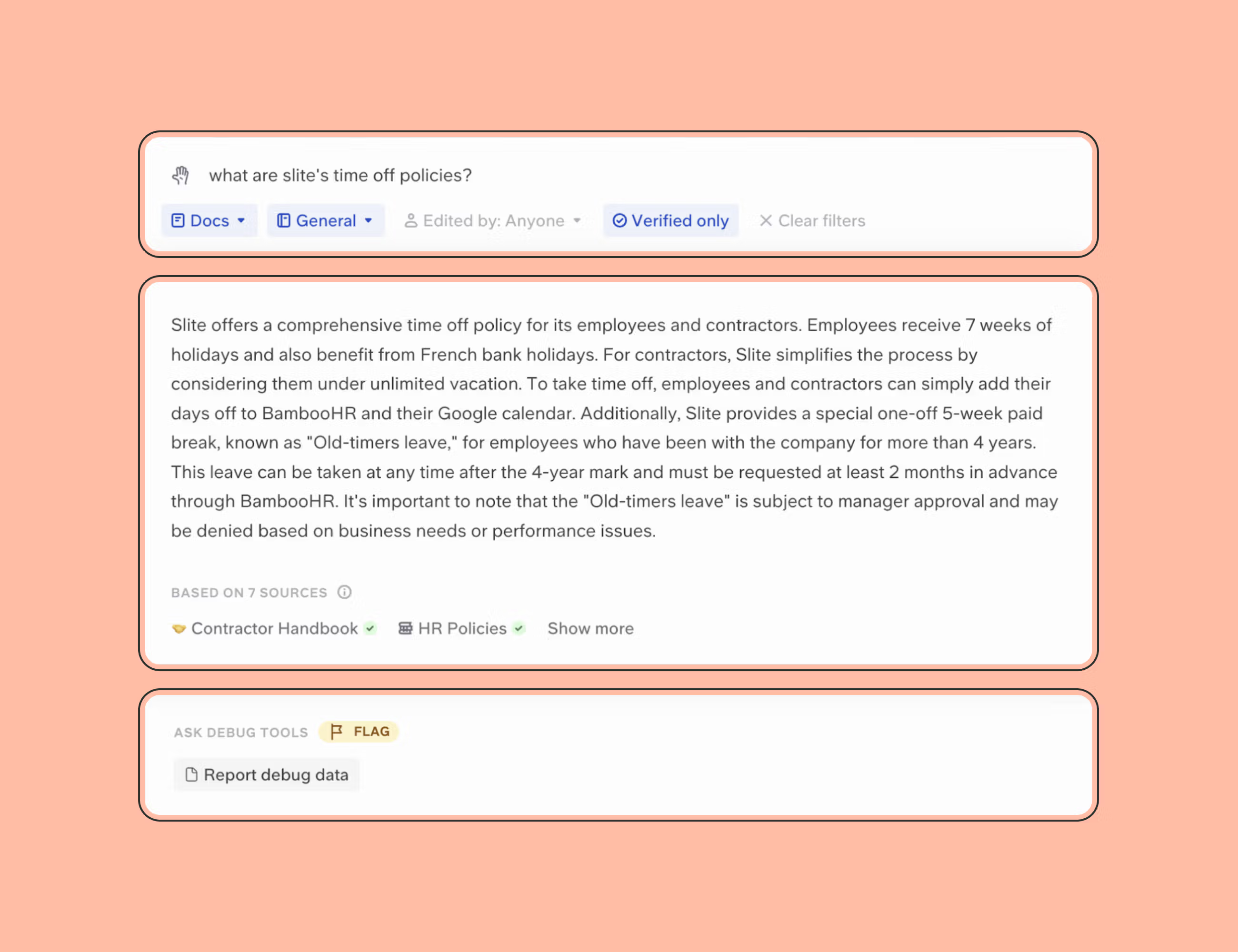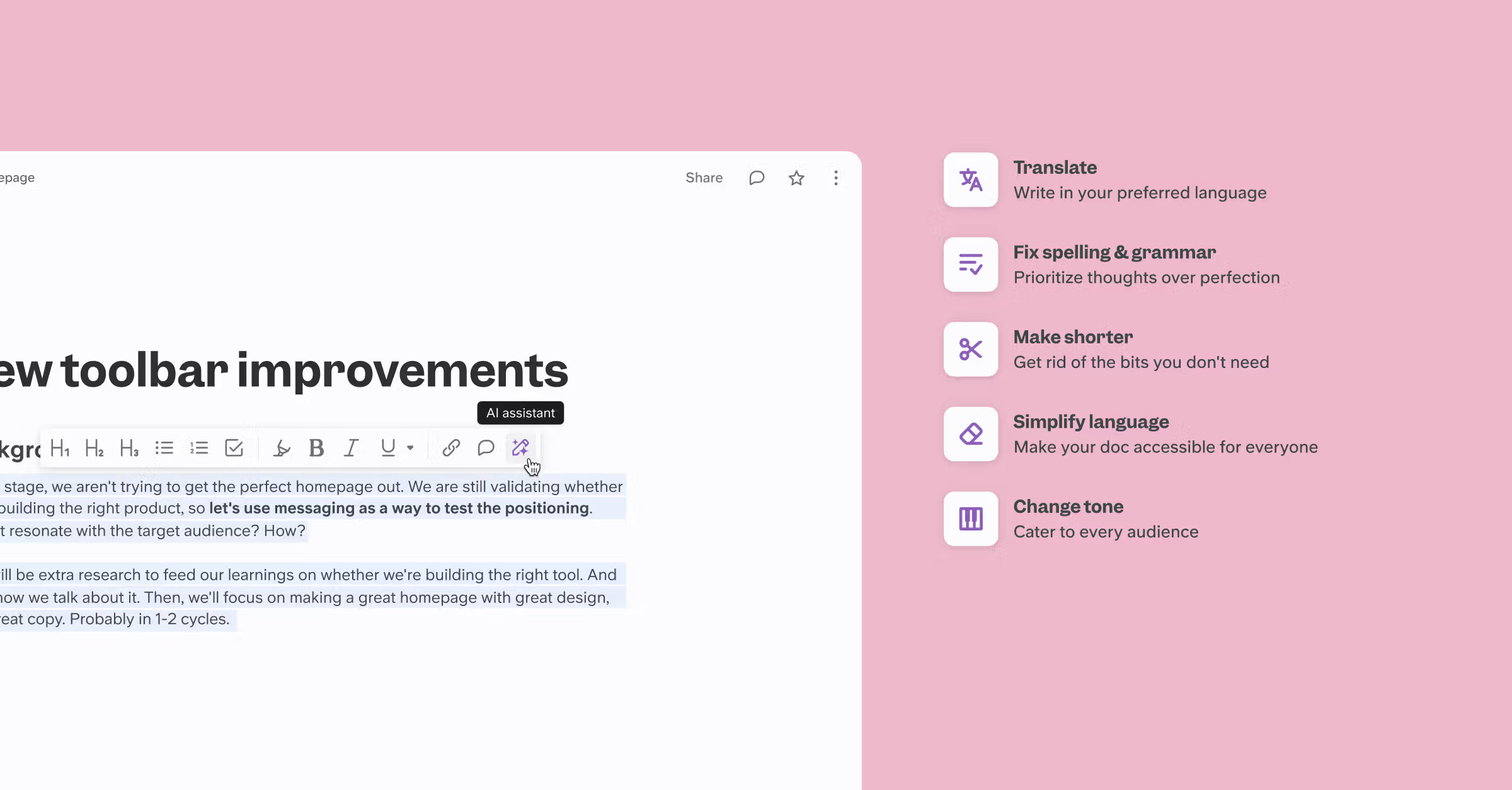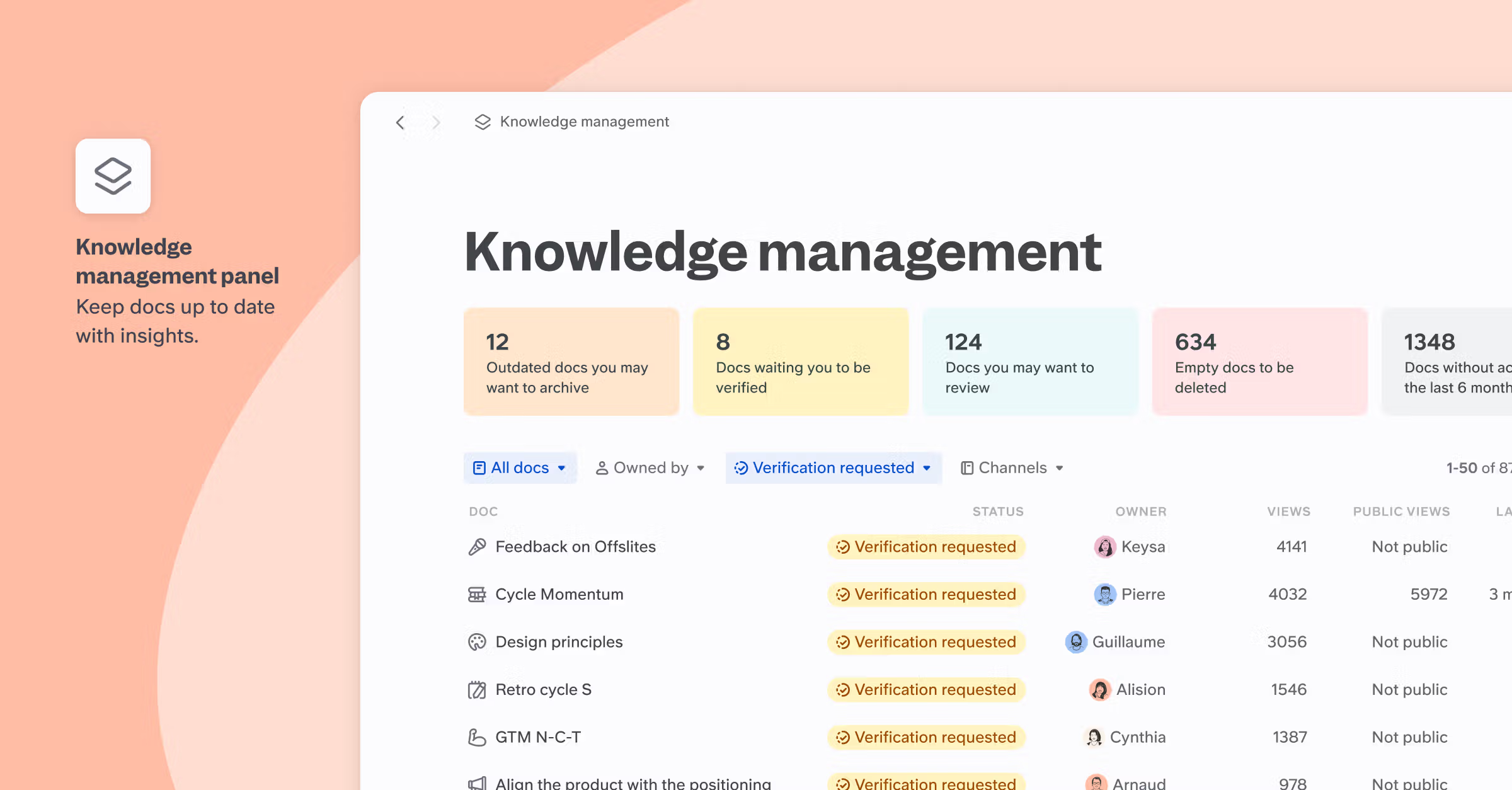Corporate wikis are often considered by companies as a top-of-mind solution to build, organize, and share their knowledge internally. You might think an internal wiki (or corporate wiki) is the same as an internal knowledge base.
It’s actually very different and you might be looking for a modern knowledge base software rather than for a wiki software.
A corporate wiki is like a giant, collaborative whiteboard where everyone can jot down ideas, share notes, and brainstorm together. It's great for fostering teamwork and keeping everyone in the loop. On the other hand, a knowledge base is more like a well-organized library, where information is carefully curated and presented in a structured way. It's perfect for storing important company documents, policies, and procedures.
So, which one is right for your company? The answer isn't always clear-cut.
It depends on your specific needs, your company culture, and the types of information you need to manage. In this guide, we'll break down the key differences between corporate wikis and knowledge bases, explore their pros and cons, and help you decide which one (or both!) is the best fit for your team.
What's a corporate wiki?
A corporate wiki lets all your employees create, edit, and manage content instantly. Wikipedia is certainly the most famous example of a worldwide wiki that can be edited by anyone in the world. A corporate wiki is like your company’s own private Wikipedia.
Corporate wikis support internal knowledge management by allowing employees to create, edit, and manage content collaboratively.
The upside? The fast, collaborative mode lets people build a comprehensive wiki quickly. Reading something that’s off? Just find the edit button and fix it, no matter who made the error. The word “wiki” actually means “very quick” in Hawaiian, and that’s why they are designed to be that way.
To optimise for speed, there are no restrictions, owners or centralized content producers. All you need is a web browser to browse through the wiki pages, read and edit content. The number of users allowed to collaborate is endless. Users are expected to keep wikis updated on a collective ad-hoc basis. The thought is to build on top of each other’s knowledge and build collective wisdom around a topic. In fact, collaboration is the most important factor in a corporate wiki. Most wikis were developed with open-source model and designed around knowledge sharing and collaboration.
The underlying approach of “minimal content oversight” is its main advantage and its main disadvantage. We’ve all seen memes of people editing Wikipedia entries of famous celebrities willy nilly. Fun? Sure. Misinforming? 100%.
Because of no verification, you have to put blind trust in a wiki’s information or double check its accuracy. You don’t have that kind of time in your job, though. When referring to a company wiki, it’d be frustrating to search for product feature details and only get a 3 month old doc as a search result. Because of this, most company wikis suck.
How does a Knowledge Base fix this? Let’s first understand what a Knowledge Base is.
What's a Knowledge Base?
A knowledge base is an information repository created, managed, and maintained for your internal stakeholders. An internal knowledge base centralizes the most crucial information for a business.
The big difference between a Knowledge Base and a Company wiki is contributor responsibility. No one’s responsible for maintaining a wiki whereas a Knowledge Base is maintained up-to-date using shared responsibility. A knowledge base offers a more structured and refined process for internal knowledge sharing, ensuring accurate and up-to-date information.
A classic Knowledge Base is produced by selected contributors like Head of Departments, leadership team, etc. They’re authorised to be a subject matter expert, document relevant information, and keep it updated with time. The accountability improves consistency and quality of knowledge across all your documents. Additionally, a knowledge base helps in managing and sharing organizational knowledge by providing a centralized location for documentation.
Most modern knowledge base software combines the best of two worlds: wikis (collaboration) and internal knowledge base (consistency, sharing, search etc.).
You can edit it content as fast as a wiki. And still have intentionally built features that help you:
- assign owners to docs/channels
- verify docs for custom periods of time
- optimise info based on viewing and engagement analytics
Keep reading below to understand what are the main benefits of managing your internal documentation using a modern internal Knowledge Base.
3 big differences between a Wiki and a Knowledge Base
Content Creation and Ownership
In a corporate wiki, everyone's a contributor. It's a democratic space where employees can add, edit, and update information as needed. This makes it a great tool for brainstorming, collaborating on projects, and documenting team knowledge. However, it also means that information can sometimes be disorganized or inaccurate if not properly managed.
Knowledge bases, on the other hand, are typically owned and managed by a specific team or department, such as HR or IT. This ensures that information is accurate, up-to-date, and presented in a consistent format. However, it also means that knowledge bases can sometimes be less flexible and collaborative than wikis.
Structure and Organization
Corporate wikis are often organized in a more free-form, interconnected way. You can link between pages, create hierarchies of information, and even embed multimedia content. This makes them great for exploring ideas and connecting different pieces of information.
Knowledge bases, on the other hand, are typically organized in a more structured, hierarchical way. Information is categorized into topics and subtopics, making it easy to find what you're looking for. This is especially useful for storing technical documentation, FAQs, and other types of structured information.
Purpose and Audience
Corporate wikis are primarily used for internal communication and collaboration. They're a great way for teams to share knowledge, document processes, and brainstorm ideas.
Knowledge bases, on the other hand, can be used for both internal and external audiences. Internally, they can be used to store employee handbooks, onboarding materials, and company policies. Externally, they can be used to provide self-service support for customers or partners. We talk about self-service in detail in our Customer Service Knowledge Base Guide.
Main disadvantages of a corporate wiki
While using a wiki for your company knowledge might sound like a good place to start to encourage knowledge curation and collaboration between your team members it comes with some critical disadvantages, such as:
Limited search functions
Wikis come with poor or even no search capabilities. In a modern world where everyone is using search engines such as Google and expects to find information in one click, it can really harm your employees' engagement with your company's knowledge.
Think of your employees as customers of your knowledge. A fast, reliable search is vital for your knowledge to be consumed. A great search will provide great customer support and improve discovery while reducing the time spent retrieving information. That's something you should be looking for in a knowledge base.
The best Knowledge Base software like Slite come with excellent search functionality.
Slite even has an AI-powered search functionality. Which essentially lets you ask questions like chatGPT and get specific, cited answers from trusted company information.

This gives your employees a way to get instant answers instead of reading multiple docs, synthesizing them, and then self-forming an answer.
Hard to edit content
In most cases, your employees will need to know markup language rules as HTML to edit content within a wiki. It makes it harder for the content to stay fresh and often ends up with no one using it at all.
Modern software for knowledge base provides "WYSIWYG" ("What you see is what you get") real-time editors. This allows for greater user experience. Furthermore, your non-technical team members won't be excluded from using it.
A Knowledge Base like Slite offers you that and AI editing features on top of it.

Slite's editor is clean, minimal, but most importantly - it's geared to help you go from first to final draft ASAP. It particularly comes in handy for use cases like:
- Turning bullet points into a well-formatted strategy doc in just 1 click. Try it here using our Magic Document Formatter.
- Change tone of content to suit the readers. You might want to be more simple and high-level for your manager. But you might want a more helpful, direct, context-rich content for your colleague who will refer to it regularly.
- Simplify working with an international team of multi-lingual employees.
In case you're curious about the daily impact of these small things, the saved minutes turn to hours saved across months. Curious to know more hacks? Our Head of Customer Success, Anouk, wrote how to use Slite's AI to improve docs.
Inconsistent content structure and Tough Maintenance
As everyone is able to edit your wiki content this often leads to inconsistency across your knowledge documents. And you can even end up with inaccuracy and gaps in your knowledge, as you have no ways to control who can edit what. This lack of control can lead to knowledge gaps, making it difficult to ensure all necessary information is accurate and up-to-date.
Modern knowledge base softwares now provide more flexibility. Depending on the control you want to apply over the content being produced and stored you can define roles for writing and accessibility. The marketing team, for instance, might be able to read the product team content without editing it and the product team can have an overview of the general marketing plan in return.
For instance, tools like Slite combat this with actually useful features like:
- Inconsistent structure? Click improve with AI, or auto-generate directories of multiple subdocs.
- Tough maintenance? Go to Slite’s Knowledge Management Panel. Get a 360-degree view of all suggested actions, and the right doc analytics to make quick calls.

Inefficient employee onboarding
Bad onboarding creates long-term churn. If you send your new employees out in the wild of a wiki, they will probably end up overwhelmed by the lack of structure.
That's why, we've always felt it's really important to rock your employee onboarding.
A wiki is great for discovery but might not play its best role when it comes to ease your employee onboarding. You'll need to be able to direct them quickly to the right content and if necessary restrict their access to it. With Slite, it's simpler. You give your employees one doc, or an onboarding checklist, to clearly outline and walk them through the whole process.
No separation of private vs. public information
Every user of a classic wiki will have access to all the content within it. You won't be able to create different types of users. Every bit of information will be available to everyone. There is no option to create a private wiki.
You might have to create different platforms to separate private and public information. You won't be able to centralize all your company information in a single place.
This makes content management harder and more time-consuming. It often leads to miscommunication, inconsistent data, and harder to share information across your whole team.
Little to no analytics
A feedback loop is key to improve your process and knowledge management system. Wikis provide little or no analytics about how your team consumes the content.
It will make it harder to improve your content over time, spot content gap and follow your team engagement. The lack of analytics in corporate wikis also makes it difficult to manage internal knowledge effectively.
So, a Wiki or a Knowledge Base? It's Not a Battle Royale
Here are a few things to consider when making your decision:
Company Size and Structure
If you're a small, nimble team that thrives on collaboration, a wiki might be your perfect match. It's a great way to encourage knowledge sharing and make everyone feel like they're part of the conversation. But if you're a larger organization with a more hierarchical structure, a knowledge base might be a better choice. Its structured format and clear ownership can help ensure accuracy and consistency across different departments.
Intended Audience
Who are you building this thing for? If it's mainly for your internal team, a wiki can be a great way to foster collaboration and build a sense of community. But if you're also planning to share information with customers or partners, a knowledge base might be a better option. Its organized structure and search functionality make it easier for external users to find what they need.
Technical Resources
Let's face it, not all wikis are created equal. Some are super easy to set up and use, while others require a bit more technical know-how. If you have a dedicated IT team, they can probably handle any technical challenges that come up. But if you're a smaller team with limited resources, you might want to choose a wiki that's known for its simplicity and ease of use.
Budget
This is always a factor, right? Open source wikis are free, which is awesome if you're on a tight budget. But paid knowledge base platforms like Slite often come with additional features and support that might be worth the investment. It all comes down to what your team needs and what you can afford.
Or, skip the debate altogether
Most companies get stuck choosing between wikis and knowledge bases, missing the real issue: your team's critical knowledge doesn't live in either one.
The breakthrough insights happen in Slack threads. Technical decisions get made in GitHub issues. Customer problems get solved in support ticket conversations. Project pivots happen during Linear discussions.
While you're debating wiki flexibility versus knowledge base structure, your most valuable information is scattered across a dozen tools where your team actually works.
Super.work sidesteps this entire debate. Instead of forcing knowledge into one centralized system, it searches across everything simultaneously. Ask "What's our mobile deployment strategy?" and get your official documentation plus the engineering discussion that revealed the deployment blocker nobody documented.
Sometimes the best knowledge management strategy isn't choosing the perfect repository - it's connecting all the places knowledge already exists. See how this works in practice.
Takeaway
Creating a wiki might seem like a good idea to centralize and enhance collaboration around your company’s knowledge. In reality, they quickly become hard to manage, they lack flexibility and are often a struggle to keep your employees engaged with.
Opting for a modern dedicated knowledge base software, unlike corporate wikis, will provide your company the best of both worlds bringing structure, ease of access, sharing and collaboration capabilities all in one place.
And if you're looking for a tool that makes it easy to track, analyze, and act on those insights, check out Slite. Or talk to our team by requesting a demo here.

